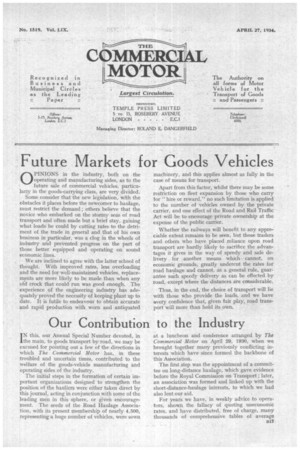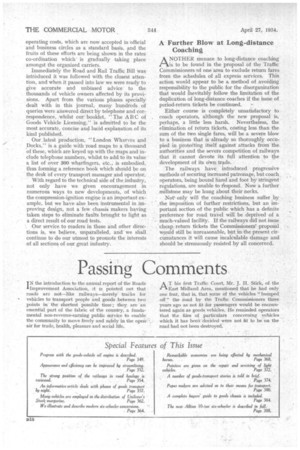Our Contribution to the Industry
Page 83

Page 84

If you've noticed an error in this article please click here to report it so we can fix it.
IN this, our Annual Special Number devoted, in the main, to goods transport by road, we may be excused for pointing out a few of the directions in which The Commercial Motor has, in these troubled and uncertain times, contributed to the welfare of the goods-vehicle manufacturing and operating sides of the industry.
The initial steps in the formation of certain important organizations designed to strengthen the position of the hauliers were either taken direct by this journal, acting in conjunction with some of the leading 11161 in this sphere, or given encouragement. The seeds of the Road Haulage Association, with its present membership of nearly 4,500, representing a huge number of vehicles, were sown at a luncheon and conference arranged by The Commercial Motor on April 29, 1930, when we brought together many previously conflicting interests which have since formed the backbone of this Association.
The first step was the appointment of a committee on long-distance haulaie, which gave evidence before the Royal Commission on Transport ; later, an association was formed and linked up with the short-distance-haulage interests, to which we had also lent our aid.
. For years we have, in weekly advice to operators, shown the fallacy of quoting uneconomic rates, and have distributed, free of charge, many thousands of comprehensive tables of average operating costs, which are now accepted in official and business circles as a standard basis, and the fruits of these efforts are being shown in the rates co-ordination which is gradually taking place amongst the organized carriers.
Immediately the Road and Rail Traffic Bill was intrOduced it was followed with the closest attention, and when it passed into law we were ready to give accurate and unbiased advice to the thousands of vehicle owners affected by its provisions. Apart from the various phases specially dealt with in this journal, many hundreds of queries were answered direct by telephone and correspondence, whilst our booklet, "The ABC of Goods Vehicle Licensing," is admitted to be the most accurate, concise and lucid explanation of its kind published.
Our latest production, "London Wharves and Docks," is a guide with road maps to a thousand of these, which are keyed up with the maps and include telephone numbers, whilst to add to its value a list of over 300 wharfingers, etc., is embodied, thus forming a reference book which should be on the desk of every transport manager and operator. With 'regard to the technical side of the industry, not only have we given encouragement in numerous ways to new developments, of which the compression-ignition engine is an important example, but we have also been instrumental in improving design, not a 'few chassis makers having taken steps to eliminate faults brought to light as a direct result of our road tests.
Our service to readers in these and other directions is, we believe, unparalleled, and we shall continue to do our utmost to promote the interests of all sections of our great industry.
A Further Blow at Long-distance Coaching
AA NOTHER menace to long-distance coaching 21',is to be found in the proposal of the Traffic Commissioners of one area to exclude return fares from the schedules of all express services. This action would appear to be a method of avoiding responsibility to the public for the disorganization that would inevitably follow the limitation of the duplication of long-distance coaches if the issue of period-return tickets be continued.
Either course is completely unsatisfactory to coach operators, although the new proposal is, perhaps, a little less harsh. Nevertheless, the elimination of return tickets, cOsting less than the sum of the two single fares, will be a severe blow to a business that is already so thoroughly occupied in protecting itself against attacks from the authorities and the severe competition of railways that it cannot devote its full attention to the development of its 6W11. trade.
The railways have introduced progressive methods of securing increased patronage, but coach, operators, being bound hand and foot by stringent regulations, are unable to l'espond. Now a further millstone may be hung about their necks.
Not' only will the coaching business suffer by • the imposition of -farther restrictions, but an important section of the public which has a definite preference for road travel will be deprived of a much-valued facility. If the railways did not issue cheap return tickets the Commissioners' proposal would still be unreasonable, but in the present circumstances it will cause incalculable damage and should be strenuously resisted by all concerned.




















































































































































































